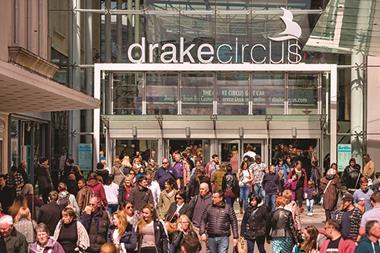OK, so it’s not a new topic of conversation, but it’s one of the property industry’s most intriguing ones, and I make no apology for returning to it.

Over the past 25 years, I have interviewed every chief executive of both British Land and Landsec – from Landsec’s Sir Peter Hunt and British Land’s Sir John Ritblat to Rob Noel and Chris Grigg today.
But during that quarter of a century, not one of them has given me a straight answer to the straight question: when will the two of you merge?
Last week, I got my chance to put the question, for the umpteenth time, to Grigg. On previous occasions, he did what all the others had done and knocked me back with some adept media training techniques.
I was so accustomed to the non-answers that I was half way through my next question before it clicked. Grigg said something different this time. He did not hit the ball back across the net with a tonne of spin.
Let’s not get over-excited. Grigg did not say he was in talks with Noel to create a £14bn property giant. Far from it. But he did say that if it made sense for shareholders, British Land would “seriously consider” it. Well, that’s something – and ‘British Landsec’ makes more sense now than it ever has.
Even the maths add up. Now is one of those rare occasions when it would be a genuine merger of equals. Landsec has fallen from its £10bn market value a couple of years back, while British Land has enjoyed a decent period in comparison. Both companies are valued at nearly £7bn. There would be no senior partner in the talks.
Find out more - read our big interview with Chris Grigg
The firms’ respective portfolios also continue to fit. Landsec may have improved its presence in the City of London, but British Land trumps it there. Likewise, Landsec dominates in the West End, where British Land has grown, but not to an extent to rival Landsec.
On retail, where Landsec has been hurt by overpaying for Bluewater and British Land has remained stable, getting together could protect the merged company in property’s most volatile arena.

When it comes to the trendy sectors of flexible workspace and build-to-rent, Noel could learn a thing or two from Grigg. In other words, while each firm has become more like the other, they also cancel out each other’s weaknesses.
There’s one more element to my gossipmongering. Both Grigg and Noel have been in their jobs for a long time (nine and seven years respectively). Surely there’s no better legacy for either of them to leave than British Landsec? It would be a UK property company that could, for the first time, genuinely compete on a global stage. They would form a company with a portfolio value approaching £30bn, and an equity base that would propel British Landsec towards becoming a top 25 global REIT.
Marriage of convenience
However, any merger would be a defensive play and while the market has long called for it, now may not be the time to force through such a marriage of convenience. Hammerson’s failed attempt to buy intu earlier this year certainly does not inspire much confidence.
But Grigg, the only boss of either firm to get even close to answering my favourite question, has got me thinking. Perhaps. Just perhaps.
.@DavidParsleyPW says there's never been a better time for 'British Landsec' (https://t.co/8fAiPOqIaj) - do you agree? This week's poll question asks:
— PropertyWeek (@PropertyWeek) June 1, 2018
Would a @BritishLandPLC and @LandsecGroup merger work?
































No comments yet